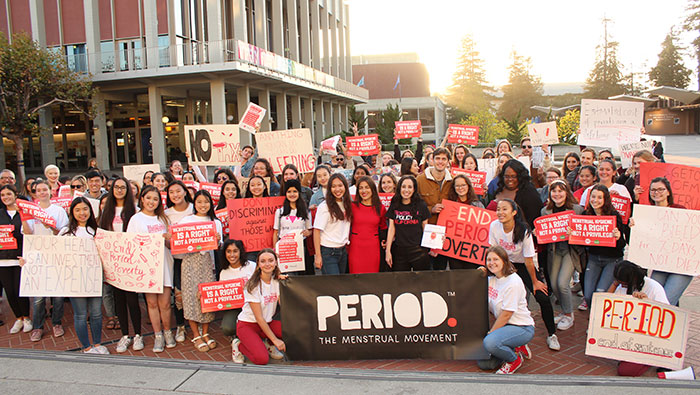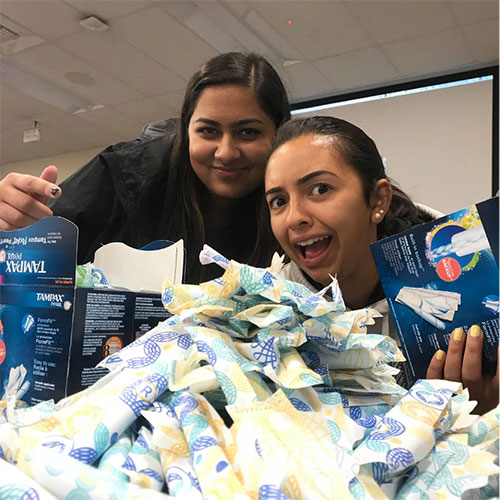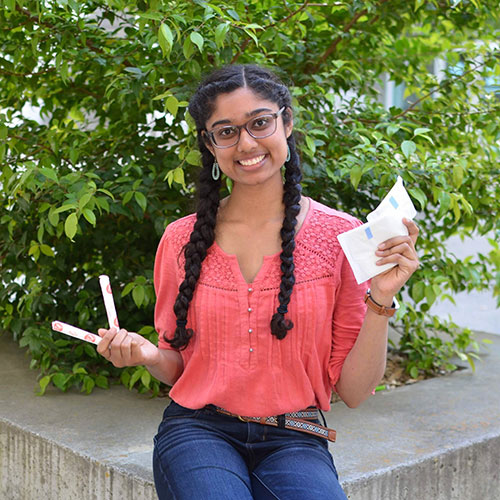
Beginning this year, California public schools and colleges will need to stock restrooms with free menstrual products, thanks to a group of UC Davis alumni and students.
What began as a push for menstrual equity on the UC Davis campus evolved into something much more — a united effort that ultimately led to new legislation and statewide change. Their efforts paid off last October, when Gov. Gavin Newsom signed AB 367, known as the Menstrual Equity for All Act of 2021.
Instrumental in this effort was Audin Leung ’21, co-founder of Free the Period, a statewide, student-led coalition working to end period poverty in California schools, colleges and universities. The organization aims to end the stigma associated with talking about menstruation and educate the public about period poverty, or the inability to access or afford period products, such as pads and tampons.
“Menstrual products are basic needs, just like toilet paper or soap,” Leung said. “We were going to do whatever we needed to do to get menstrual products for our peers. Every step of the way, we learned about how the systems work; about how to make the change that we want to see in our communities.”
Students have been advocating for change at UC Davis since 2017, when Annie Wang ’20 founded a UC Davis chapter of the nonprofit PERIOD. That group is now known as Davis Period.

In 2018, a one-year pilot program on the Davis campus was funded with $12,000 from the Division of Student Affairs. More than 100 student volunteers signed up to help stock free menstrual supplies in bathrooms across campus. They diligently tracked usage to show evidence of use or misuse as part of their effort to assess the viability of such a program.
“This was groundbreaking research for us,” Leung said. “We were able to show that students won’t just stockpile products. There was a lot of interest. People left notes on the boxes to say ‘thank you very much for doing this.’”
This pilot program led the group to share their research and begin coordinating with organizations at sister UC campuses. Soon, Free the Period was formed, and advocates from across the state were working to pass legislation that would benefit all students.
“Grassroots and student organizing can really make a huge difference and create transformative change,” said Melody Yan ’21, who managed Free the Period’s communications and education team. “We were just a bunch of students who cared about this issue … and then we passed a bill. It provides students with the most basic necessities and products that school districts and colleges should have been providing in the first place.”
That’s not to say it was easy. There was a lot of back and forth, and numerous meetings pitching the proposed bill to legislators.
“Coalition development and organizing were critical to moving the bill forward and building widespread support,” said Prachi Verma ’21.
As policy coordinator for Free the Period, she helped with lobbying efforts, meeting with members of the state Legislature and working to garner support for the proposed bill. Verma also focused on coordinating efforts with community colleges, other UC campuses and California State University campuses, and connecting with others who had advocated for menstrual equity in their communities.

“One of the big highlights of the bill is the inclusiveness of it,” Verma said. “We wanted to make sure we thought about privacy, accessibility, students with different gender identities, and making sure that everyone is able to access menstrual products without stigma and without fear of judgment.”
The menstrual equity bill, authored by Assemblymember Cristina Garcia, is the first in the world to include unique language about accessibility considerations for ability and gender inclusivity. This was the result of much discussion and community input, according to Leung.
“One advantage of going to UC Davis is its proximity to the capital. We were able to go to the legislature and talk to people about policy,” they said.
The Menstrual Equity for All Act of 2021 requires all public schools serving students in grades six to 12 to stock restrooms of all genders with free menstrual products by the start of the 2022-23 school year. It also requires community colleges and California state universities provide an adequate supply of products in at least one central location, and encourages UC campuses to do the same.
UC Davis already provides free period products. Following the 2018 pilot program and encouraged by student advocacy, UC Davis installed free menstrual product dispensers in 23 bathrooms across campus, in what was the first program of its kind on a UC campus. Additional funding to purchase dispensers and products was provided in 2020 from the Council on Student Affairs and Fees, and through a wellness grant to Davis Period. The administration also created a Menstrual Equity Taskforce.
Leung is transitioning out of their leadership role in Free the Period to make room for the next generation of student leaders, but they said the work is not done.
“This bill is just the start. In every school district and university, we will need to work to ensure the law is put into action,” Leung said. “The ultimate goal is to normalize this and have free menstrual products in every public bathroom.”